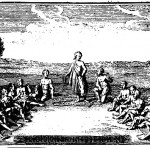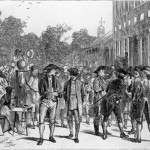Minnesota Representative Michele Bachmann once accused Barack Obama of holding positions that are "anti-American" (and she was not the first). What did she mean? In order to define what it means to be "anti-American" we should define what it means to be "American" and use examples from history to see if our judgment is fair or even … [Read more...]
Things You Don’t Talk About In Polite Company
In 2002 President George W. Bush said, “The public education system . . . is where children from all over America learn to be responsible citizens, and learn to have the skills necessary to take advantage of our fantastic opportunistic society.” At first blush this is just a gaffe, Freudian in my opinion. But there is much that is more of … [Read more...]
Why Tribes are Vital to Success in the 21st Century, Part 3: Foundations of American Freedom
This is part 3 of a 3-part article. Read Part 1 Here Read Part 2 Here The most accurate way, then, to diagram the American governmental system is to diagram the local system correctly, then the federal and state levels with their three branches each, separations of power and checks and balances. But how exactly does one diagram the local … [Read more...]
Why Tribes are Vital to Success in the 21st Century, Part 2: Freedom at the Local Level
This is part 2 of a 3-part article. Read Part 1 Here Civics 101 The first constitutions and governments in America were local, and there were hundreds of them. These documents were the basis of later state constitutions, and they were also the models in which early Americans learned to actively cooperate to govern themselves. Without … [Read more...]
Why Tribes are Vital to Success in the 21st Century, Part 1: Our Tribal Roots
This is part 1 of a 3-part article. Subsequent segments will be published daily. SETH GODIN'S RUNAWAY BESTSELLER Tribes took a quaint anthropological label and turned it into a pop culture buzz-word. And while his timely ideas helped articulate a fresh and needed approach to marketing and beyond, the power of tribal culture is far greater … [Read more...]
Beyond the Vote, Part 4: The Big Decision
This is part 4 of a 4-part article. Read Part 1 Here Read Part 2 Here Read Part 3 Here The answer to these questions is for citizens to begin to study and think a lot more about government and to stop ignoring freedom by leaving it to the political professionals. Unless regular people realize that freedom is up to them, not the experts, … [Read more...]
Beyond the Vote, Part 3: Responses to Being Patronized
This is part 3 of a 4-part article. Read Part 1 Here Read Part 2 Here Read Part 4 Here When a few citizens realize that they are being “handled” by the professionals of their party, the first response is naturally to want to elect better party leaders. When time shows that this doesn’t work -- that in fact it is the nature of party … [Read more...]
Beyond the Vote, Part 2: The End of History
This is part 2 of a 4-part article. Read Part 1 Here Read Part 3 Here Read Part 4 Here Francis Fukayama predicted in the 1990s that with the fall of the Berlin Wall and end of the Cold War this conflict between the rich and poor nations was over; he called this “the end of history,” citing both Hegel and Marx. In the ensuing model of … [Read more...]
Beyond the Vote, Part 1: Keynesianism
This is part 1 of a 4-part article. Read Part 2 Read Part 3 Here Read Part 4 Here Imagine what would happen if a huge chunk of citizens stopped accepting what they are told by one of the parties, stopped just aligning themselves with candidates from one of the monopoly parties, and started deeply studying, analyzing and thinking about the … [Read more...]
Unintended Consequences of Arizona’s Recent Immigration Law
In 1850, French economist Frederic Bastiat penned the essay "That Which Is Seen and That Which Is Unseen" to illustrate how lack of foresight relates to the law of unintended consequences. Through a series of examples, including the parable of the "Broken Window," Bastiat demonstrated that we tend to view only the immediate visible effects of … [Read more...]












